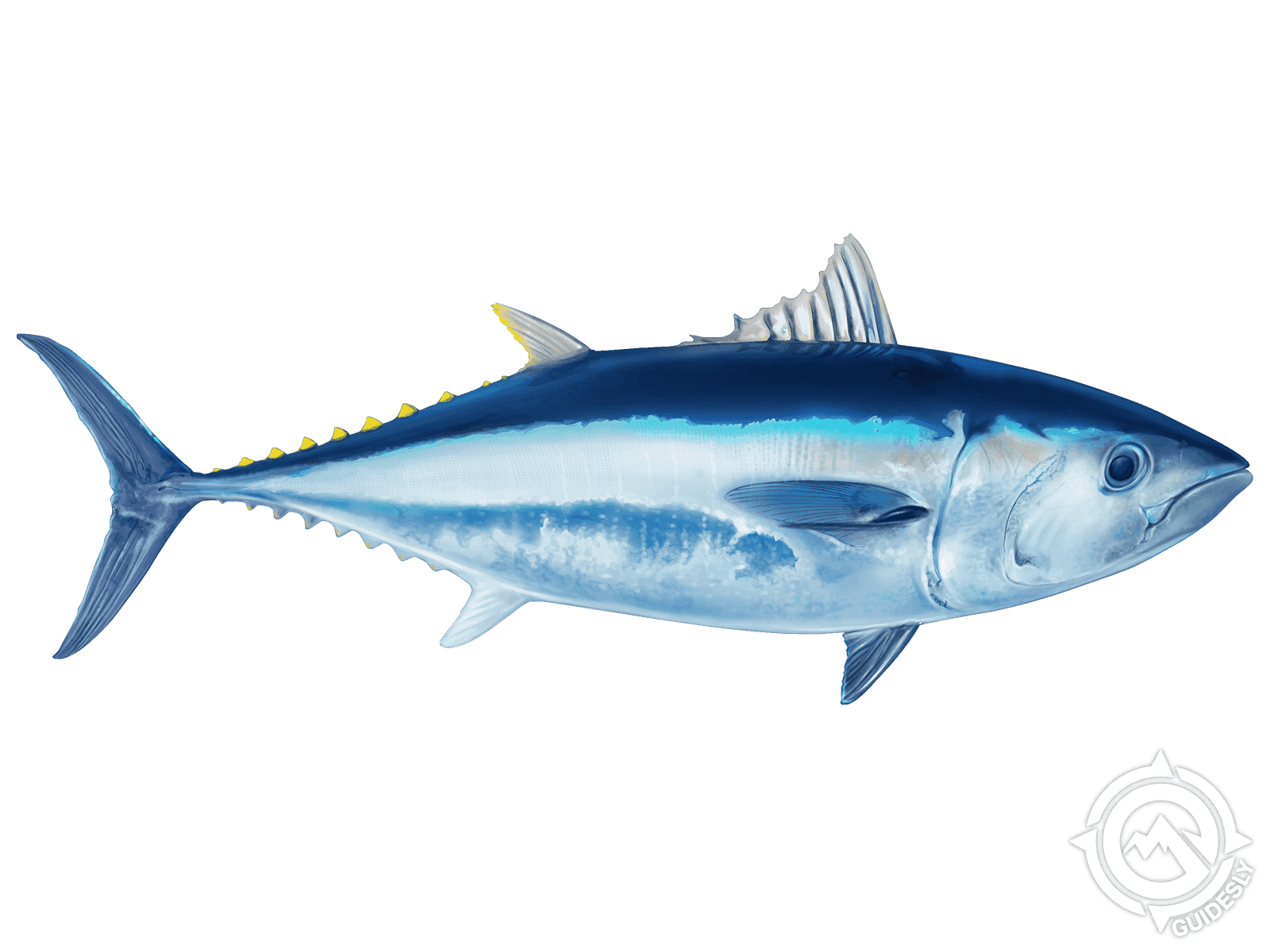Pacific Bluefin Tuna

Species Details
Thunnus Orientalis
Scombridae
Perciformes
Offshore
130 - 907 lbs.
48" - 120"
Pacific Bluefin Tuna (Thunnus Orientalis) Fish Description
The Pacific Bluefin Tuna (Thunnus orientalis) is one of the largest tuna species in the world. They can grow up to ten feet long and can weigh half a ton. They are also highly sought after for their delicious fatty meat that is said to be best consumed raw as sushi or sashimi. One of these has been sold for more than three million dollars by a sushi store owner in Japan.
Much like other tuna species, its body is shaped like a torpedo—long, circular, and streamlined. It has retractable fins that help them dart through the waters at great speeds without much drag. They’re mostly silvery in color, though the upper part a bit darker with a gray, blue, to green iridescence; while the lower half of its body has a lighter hue. The belly however is splattered with small dots that are sometimes colorless, sometimes grayish-silvery in color. Another distinguishing feature of the Pacific Bluefin Tuna is the series of fins that are usually colored with a yellow tinge with black edges.
The Pacific Bluefin Tuna is known to live up to more than twenty years, but the average lifespan tends to be between ten to fifteen years. Spawning usually occurs from April to August in East Asia, specifically off the coasts of eastern Taiwan, in the Philippine Sea, as well as in the Sea of Japan. They reach maturity at about five years of age. They are also predatory and preys on other fishes, including mackerels, sardines, pompanos, herrings, anchovies, and even other smaller tunas. Although most of their diet is fish, they also occasionally eat crabs, krill, octopi, squids, and other marine invertebrates.
Pacific Bluefin Tuna Interesting Facts
- The biggest one ever caught using a traditional rod and reel was a 907-pounder.
- The monstrous fish was caught off the coast of New Zealand by a female angler named Donna Pascoe.
- It took four hours for Pascoe—with the help of four men and the boat’s anchor winch—to reel in and land the humongous fish.
- They migrate back and forth several times across the vast Pacific Ocean—from Asia to California and back again—in their lifetime.
- They also sometimes migrate down to the waters of Australia and New Zealand.
- The Pacific Bluefin Tuna is a highly-prized commodity in the seafood market.
- Each one can sell for thousands of dollars in the seafood market.
- They are typically auctioned off in Japan.
- A 612-pounder was auctioned in Japan and was bought by sushi shop owner, Kiyoshi Kimura, for three million dollars—the most expensive one so far.
- There are three types of Bluefin tuna—Atlantic, Pacific, and Southern.
- About 80% of Atlantic and Pacific Tunas are consumed in Japan.
Average Size and Swimming Speed
Aside from its enormous size, the Pacific Bluefin Tuna is also a well-known speedster of the ocean. They are capable of swimming at an average of twelve to fifteen miles per hour—or sometimes even faster of up to twenty miles per hour for shorter periods.
The Pacific Bluefin Tuna is also the second (next to their cousin, the Atlantic Bluefin Tuna) biggest tuna species out there with an average size of four to seven feet, weighing at around one hundred and thirty pounds.
Range and Habitat
As the name suggests, the Pacific Bluefin Tuna is endemic in the Pacific Ocean, ranging from East Asia to North America. Although most of the population is found within the northern part of the Pacific, this fish is migratory as some can also be found in the southern hemisphere—particularly near the coasts of Australia and New Zealand. In the US, they are often fished off the coast of southern California.
The Pacific Bluefin Tuna is a pelagic fish that are found in large groups or schools in the open ocean, often in depths between eight hundred to over a thousand feet.
Fishing Tips
The Pacific Bluefin Tuna is a pretty elusive fish as they are said to be easily spooked. Fortunately, they are also known to be voracious predators, which you can take advantage of by employing chumming or using live baits. For live baits, we highly suggest using mackerels, herrings, or squids, which are known to be quite lively on a hook, therefore effectively attracting the prized fish you’re aiming for. Ideal rods are popper rods equipped with a spinning reel, specifically those built for heavy-duty fishing but lightweight—a perfect combo for reeling in a fish built for speed and endurance. Lastly, if you’re gunning for this highly-sought fish, in particular, you will need to cast your line way offshore as the Pacific Bluefin Tuna is much easier to spot in the open waters.







